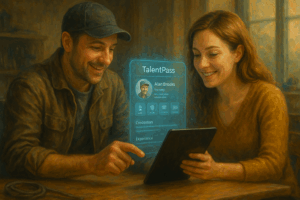How can Universal Talent Passport help hospitals be better partners with nurses?
Healthcare systems across the world are struggling with workforce shortages, burnout, skills gaps, and rising mobility among clinicians—especially nurses. Hospitals want to better support, retain, and advance their nursing staff, but traditional HR systems rarely give nurses the tools they need to articulate their full skill set, map their experience to career pathways, or communicate what support they need to grow.
A Universal Talent Passport (UTP) provides nurses with a lifelong, portable, structured record of their skills, experience, training, competencies, accomplishments, and aspirations. It gives nurses agency over their professional identity—and gives hospitals a clearer, more equitable way to support and partner with their workforce.
Here’s how UTPs can transform the hospital–nurse relationship.
1. Empowering Nurse Career Development and Mobility
Nurses are constantly learning—through certifications, bedside experience, mentorship, rotations, crisis response, and informal leadership moments. But much of this learning is invisible in HR systems.
A Universal Talent Passport helps nurses:
- Track skills and competencies across their entire career
- Document specialized experience (ICU, trauma, pediatrics, telehealth, OR, etc.)
- Organize CEUs, certifications, microcredentials, and on-the-job achievements
- Identify emerging strengths and areas for development
- Explore advancement pathways with more clarity
- Showcase their full professional story when applying for new internal or external roles
Outcome:
Nurses take control of their career trajectory, while hospitals benefit from clearer internal pipelines and improved retention.
2. More Equitable and Precise Recruitment
Hospitals struggle to identify the right candidates for specialized or hard-to-fill roles. Resumés vary in format. Titles don’t reflect skills. Experience is often described inconsistently.
With UTPs, nurses can present standardized, skills-based profiles that help hospitals:
- See candidates’ true capabilities
- Reduce reliance on proxies like tenure or title
- Evaluate clinical and non-clinical competencies with greater accuracy
- Mitigate bias that arises from unstructured résumés
- Identify talent pools for emerging care models (digital health, community-based care, etc.)
Outcome:
Recruitment becomes more fair, more efficient, and more aligned with real patient-care needs.
3. Stronger Clinical Support Through Skill Visibility
Nurse managers want to support their teams, but performance conversations often rely on anecdotal or incomplete information. Nurses may lack a structured way to advocate for the training or mentorship they need.
A Universal Talent Passport allows nurses to:
- Show patterns in skill development over time
- Highlight areas where additional support could strengthen performance
- Present evidence of growth, training, and competency achievements
- Document contributions that are often overlooked or informal
Managers can then respond with:
- Targeted professional development
- Appropriate mentorship pairings
- More informed clinical assignment decisions
- Recognition for growth that might otherwise go unseen
Outcome:
Performance support becomes proactive, collaborative, and growth-oriented—not punitive or guesswork-based.
4. Smarter Workforce Planning in a Dynamic Healthcare Environment
Hospitals constantly face shifting demands:
- New technologies
- Evolving patient acuity
- Staffing shortages
- Expansion of specialized service lines
- Regulatory and credentialing requirements
Universal Talent Passports help hospitals understand their workforce at a deeper, more skills-oriented level—when nurses choose to share this information.
Hospitals can voluntarily receive insights such as:
- Skill gaps across departments
- Emerging competencies that could support new service models
- Untapped internal talent capable of advanced practice or leadership roles
- Areas where support, cross-training, or recruitment is most needed
Outcome:
Hospitals plan more strategically, while respecting nurse autonomy and data privacy.
5. A Healthier, More Respectful Relationship Between Hospitals and Nurses
The healthcare workforce crisis is not only about staffing—it’s about dignity, empowerment, recognition, and trust.
A Universal Talent Passport:
- Gives nurses ownership of their professional identity
- Helps nurses feel seen and valued beyond job titles or shift counts
- Reduces friction in navigating career transitions or internal mobility
- Strengthens communication between nurses and leadership
- Supports well-being by giving nurses clarity and agency over their growth
Outcome:
Stronger nurse satisfaction. Better retention. A more resilient workforce.
UTPs Create a Stronger, More Collaborative Future for Nursing
Universal Talent Passports help hospitals become better partners to nurses by:
- Empowering nurses to understand and express their skills
- Improving fairness and accuracy in hiring and advancement
- Supporting continuous professional development
- Enhancing communication between staff and leadership
- Strengthening workforce planning with voluntary, insight-rich data
- Building trust, agency, and long-term career satisfaction
They create a future where nurses are better supported, better understood, and better positioned to thrive—and where hospitals can build stronger, more sustainable care teams.





